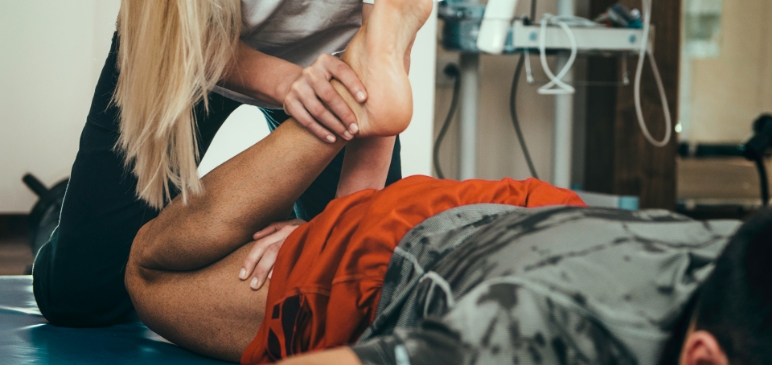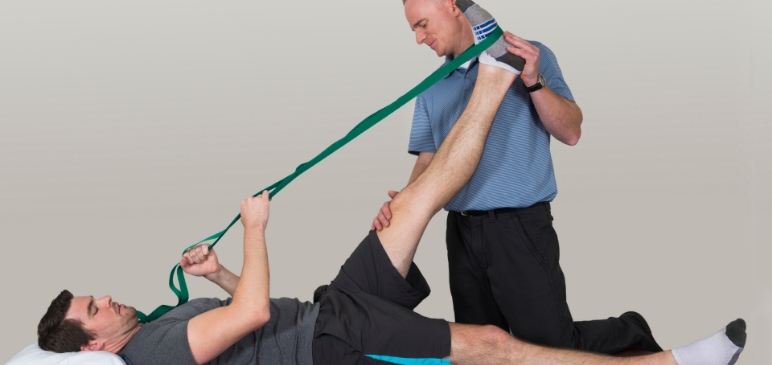
September 3, 2025
Starting something new, especially when it comes to your health, can bring a lot of questions. At Partners in Canadian Veterans Rehabilitation Services (PCVRS), we understand that and want to make every step of your rehabilitation journey as clear, supportive, and empowering as possible.
If you’ve been referred for physiotherapy rehabilitation services, you might be wondering: What does a physiotherapist do? What will they ask me to do?
Physiotherapy helps improve how your body moves, feels, and functions. Physiotherapy is about helping you rebuild strength, mobility, and confidence in your movements. Physiotherapy helps improve your function at home, in the community and at work.
You’ll work with a trained professional who understands what your body has been through, and knows how to help you move towards your functional goals within safe limits.
The first appointment is mostly a learning session. Your physiotherapist will learn about your history, your treatment so far, your body, your goals, and your challenges. This is a starting point in reaching your rehabilitation goals.
Here’s what you can expect:
1. A Friendly Welcome:
Your physiotherapist will introduce themselves and explain how physiotherapy can support your rehabilitation journey. With your consent, they’ll ask about your medical history, service-related injuries, and how your health problem impacts your function.
2. A Discussion About Your Goals:
What do you want to get back to? Maybe it’s returning to work, walking further distances, lifting your kids or grandkids so you can do more with your family, or engaging in community sports. Your physiotherapist will work with you to help you reach your rehabilitation goals.
3. A Physical Assessment:
Your physiotherapist may look at things like:
Your physiotherapist will guide you every step of the way and explain the purpose of their testing and questions. This is all about understanding your current functional abilities so your physiotherapist can tailor your rehabilitation services to help you achieve the goals outlined in your Rehabilitation Plan.

4. Education and strategies for self-management:
Sometimes physiotherapists use manual therapy techniques like gentle joint mobilizations or soft tissue work to help improve your function. If this is recommended, they’ll always explain it first and check in with your comfort level.
5. A personalized plan:
By the end of the session, your physiotherapist will go over what they’ve learned and what the next steps might look like. That could include:
At PCVRS, we’re here to support you in your rehabilitation journey.
Physiotherapy is not just about getting stronger, it’s about regaining freedom, control, and confidence in your body again. And it all starts with that first appointment.

January 1st, 2026
The Rehabilitation Services and Vocational Assistance Program (RSVP) is all about helping you overcome challenges caused by your service-related eligible health problems.

December 8th, 2025
Starting a new phase in your rehabilitation journey may bring questions, especially if you are having a functional capacity evaluation (FCE). You may wonder what it is, why it's important, and what to expect during the evaluation.

November 6th, 2025
At Partners in Canadian Veterans Rehabilitation Services (PCVRS), we believe your rehabilitation services should be coordinated, supportive, and clear.
That’s why we start with an interprofessional assessment to determine your holistic rehabilitation needs. In an interprofessional assessment, you will meet with multiple Rehabilitation Service Professionals (RSPs) to get a complete picture of your current health, abilities, and goals. It may include multiple appointments over one or two days depending on the availability of RSPs, your needs, and schedule.
General Program Information
About the Rehabilitation ProgramRehabilitation teamRehabilitation journeyGBA PlusFAQFor Businesses
Hiring a VeteranPartners in Canadian Veterans Rehabilitation Services
Rehabilitation Services and Vocational Assistance Program
